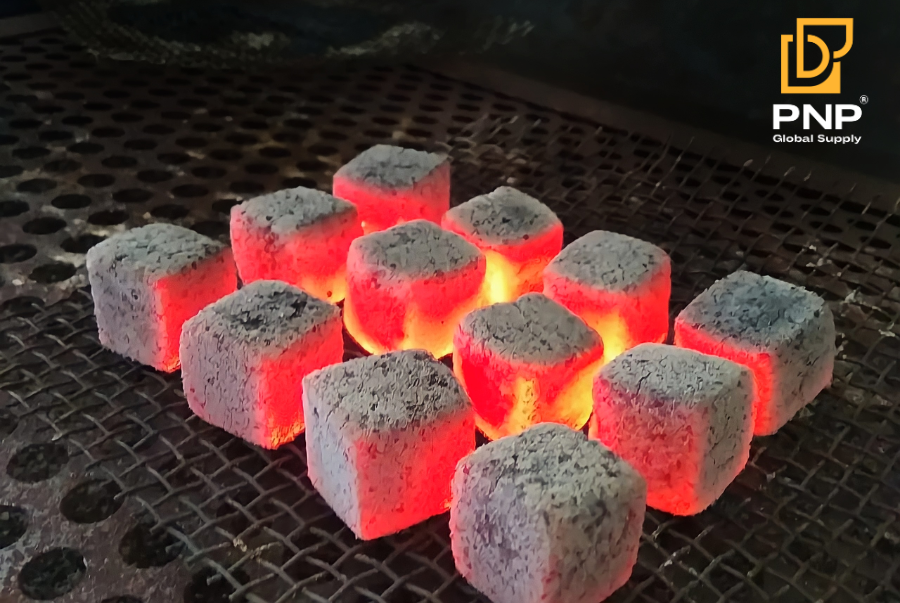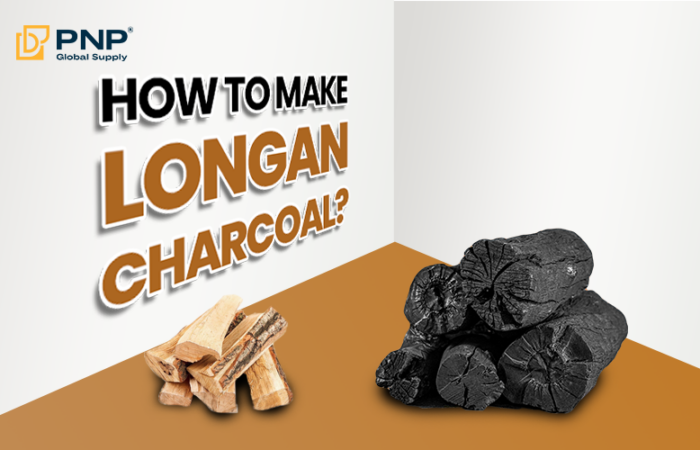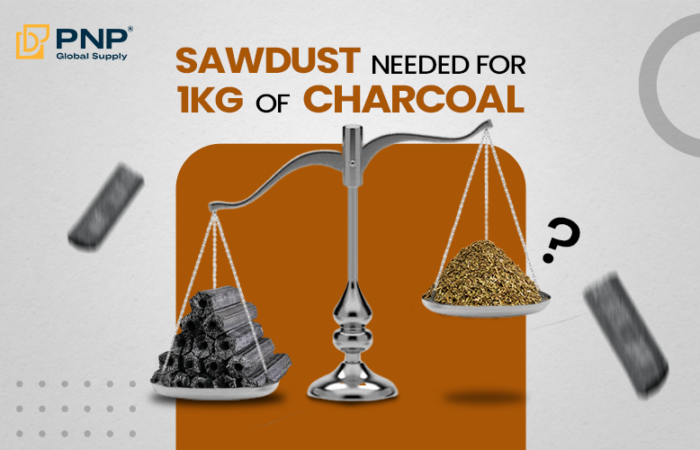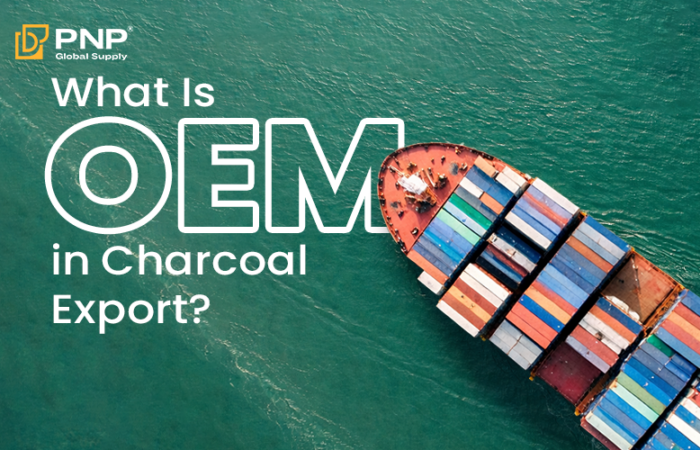Coconut charcoal smokeless is becoming a popular choice for those who love cooking and want to protect the environment. With the ability to burn long, have little smoke and be environmentally friendly, Coconut charcoal smokeless not only makes BBQ parties more delicious but also minimizes the negative impact on our planet. However, the question is whether Coconut charcoal smokeless is really safe? This article will help you learn in detail about the safety and benefits of Coconut charcoal smokeless.

What is Coconut Charcoal smokeless?
Coconut charcoal smokeless is produced from coconut shells, a by-product that is often discarded after extracting coconut meat and water. Coconut charcoal smokeless are heated at high temperatures in the absence of oxygen to produce charcoal, a process called pyrolysis. The result is Coconut charcoal smokeless that has a high carbon content, burns strongly and for a long time, and is an ideal choice for cooking and heating.

Benefits of Coconut charcoal smokeless
Environmentally Friendly
One of the biggest benefits of Coconut charcoal smokeless is its ability to reduce emissions and smoke. Compared to traditional charcoal, Coconut charcoal smokeless burns with less smoke and produces less greenhouse gases, helping to minimize negative impacts on the environment. Besides, using Coconut charcoal smokeless as raw material helps reduce the amount of agricultural waste, contributing to environmental protection.

Energy Efficiency
Coconut charcoal smokeless has a high carbon content, helping it burn strongly and for a long time. This not only saves fuel but also creates stable temperatures, ideal for BBQ grills and other heating applications. Good heat retention also helps food cook evenly and retain its natural flavor.

Safe Use
Coconut charcoal smokeless does not contain toxic chemicals such as sulfur or volatile organic compounds, making it a safe choice for cooking. However, it should be noted that, although Coconut charcoal smokeless burns with little smoke, it is still necessary to ensure good ventilation when used indoors to ensure health safety.
Coconut charcoal smokeless Production Process
The Coconut charcoal smokeless production process is quite complicated and requires careful control at each stage to ensure product quality and performance.
Raw Material Collection
Origin: Coconut shells are often collected from coconut processing factories or coconut growing areas. Coconut shell is a waste product after getting coconut water and coconut meat.
Preliminary Processing: After collection, coconut shells are cleaned and dried to remove impurities such as dirt, sand and soil.

Roasting Coconut shells
Kiln Process: Coconut shells are fired in specialized kilns at high temperatures, usually from 400°C to 500°C. This process is called pyrolysis, in which coconut shells are burned in the absence of oxygen. This helps convert coconut shells into charcoal without burning to ash.
Temperature Control: The firing temperature needs to be strictly controlled to ensure that the coconut shell burns evenly and achieves the best charcoal quality.

Charcoal Cooling and Harvesting
Cooling: After the firing process is completed, Coconut charcoal smokeless needs to be cooled slowly to avoid breakage and ensure quality. The cooling process usually lasts from a few hours to a day.
Harvesting: After cooling, the charcoal is harvested and checked for quality. Charcoal pieces that do not meet standards will be discarded to ensure the final product is uniform in quality.

Crushing and Screening
Crushing: After harvesting, Coconut charcoal smokeless is crushed to reach the desired size and shape. The grinding process helps create uniform charcoal pellets, making it easy to pack and use.
Screening: After grinding, the charcoal is screened to remove remaining debris and impurities. This ensures that the final product is pure Coconut charcoal smokeless, free of harmful impurities.

Tablets (If Needed)
Shaping: In some cases, Coconut charcoal smokeless can be pressed into small pellets for easy use and storage. The pelleting process enhances the durability and flammability of charcoal.

Packaging and Storage
Packaging: Coconut charcoal smokeless is packed into specialized packaging, usually paper bags or moisture-resistant plastic bags to keep the charcoal dry and avoid mold.
Storage: Products are stored in a dry and cool warehouse to ensure quality is not affected by humidity and temperature.

Applications of Coconut charcoal smokeless
Coconut charcoal smokeless, with many outstanding advantages, is widely used in daily life and various industries.
Cooking and BBQ
Coconut charcoal smokeless is widely used in BBQ parties and cooking thanks to its ability to burn for a long time, with little smoke and maintain a stable temperature. This is the ideal choice for grilling meat, seafood, and vegetables without affecting the natural flavor of the food.

Water Filter
Coconut charcoal smokeless has a porous structure, helping to absorb impurities and toxic substances, and is used in water filtration systems. Coconut charcoal smokeless has the ability to remove organic impurities, heavy metals and other contaminants, making water cleaner and safer for daily use.

Industry
Coconut charcoal smokeless is used in many different industries such as metallurgy, cement production, and wastewater treatment. In the metallurgical industry, Coconut charcoal smokeless helps maintain high and stable temperatures, necessary for the production and processing process.

Land Reclamation
Coconut charcoal smokeless ash after fire can be used as fertilizer, improving soil fertility and providing essential minerals for plants. This helps increase agricultural productivity and maintain soil health.
Is Coconut charcoal smokeless safe?
Coconut charcoal smokeless is often considered a safe and environmentally friendly option for cooking and heating activities. However, to better understand whether Coconut charcoal smokeless is toxic or not, we need to consider some important factors:
Chemical Composition of Coconut charcoal smokeless
High carbon content: Coconut charcoal smokeless is mainly made up of carbon, helping it burn strongly and maintain a stable temperature. The high carbon content also helps reduce smoke and emissions compared to other types of charcoal.

No toxic chemicals: The process of producing Coconut charcoal smokeless often does not use additives or toxic chemicals. This makes Coconut charcoal smokeless safer when used to cook food.
Fire Emissions
CO (monoxide): Although Coconut charcoal smokeless does not contain toxic chemicals, when burnt, it can produce CO (monoxide). This gas is toxic if inhaled in closed environment or lack of ventilation. To avoid the risk of CO poisoning, users should ensure good ventilation when burning Coconut charcoal smokeless, especially in enclosed spaces.
CO2 emitted from Coconut charcoal smokeless is lower
CO2 (dioxide): Coconut charcoal smokeless also produces CO2, a greenhouse emissions. However, the amount of CO2 emitted from Coconut charcoal smokeless is lower than other wood charoal, reducing the impact on climate change.
How to Use Safely
Ensure Ventilation: When using Coconut charcoal smokeless in an enclosed space such as a kitchen or heating room, ensure there is adequate ventilation so that CO gas does not accumulate. Open windows or use ventilation fans to ensure air circulation.
Keep Away from Children and Flammable Objects: To avoid the risk of fire and explosion, keep Coconut charcoal smokeless out of reach of children and flammable materials such as cloth and paper.
Use proper burning equipment: Using Coconut charcoal smokeless is specially designed to ensure safety and efficiency. These devices help control temperature and emissions better.
Choosing Quality Coconut charcoal smokeless
Quality check: Buy Coconut charcoal smokeless from reputable suppliers and have quality certification. Check the information on the packaging to ensure that charcoal does not contain toxic additives.
Reviews from users: Refer to the reviews and feedback from users to choose a good quality and safe Coconut charcoal smokeless.
Conclusion
Coconut charcoal smokeless is often considered safe and non -toxic when used properly. However, ensuring proper ventilation and use of charcoal-burning equipment is very important to avoid the risk of CO poisoning and unwanted accidents. Choosing quality Coconut charcoal smokeless from reputable suppliers and following safety measures will help you take full advantage of the benefits of this product without worrying about safety issues. Hopefully the above information will help you better understand the safety of Coconut charcoal smokeless and how to use this product effectively and safely.
________________________________
Contact us for more information
Facebook: PNP Charcoal
Instagram: PNP Charcoal
Email: info@pnpglobalsupply.com




